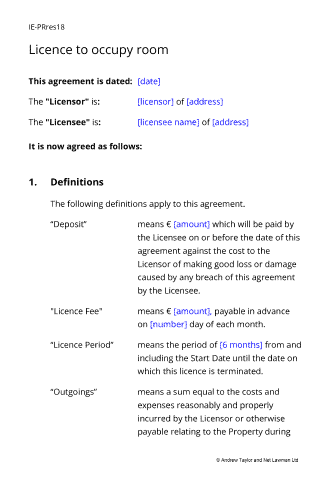

Use this lodger agreement to rent a room in your home to one or more people. This agreement creates a licence to use the property, with far fewer legal requirements for the landlord than a lease or a tenancy.
Compliant with the latest law Document propertiesMicrosoft Word DOCX Apple Pages RTF
Backed by our watertight guaranteeIf the document isn’t right for your circumstances for any reason, just tell us and we’ll refund you in full immediately.
Written in plain EnglishWe avoid legal terminology unless necessary. Plain English makes our documents easy to understand, easy to edit and more likely to be accepted.
Guidance notes includedYou don’t need legal knowledge to use our documents. We explain what to edit and how in the guidance notes included at the end of the document.
Support from our legal teamEmail us with questions about editing your document. Use our Lawyer Assist service if you’d like our legal team to check your document will do as you intend.
Up to date with the latest lawOur documents comply with the latest relevant law. Our lawyers regularly review how new law affects each document in our library.
This document grants permission to one or more people to occupy a room in your home under the terms agreed.
There is no requirement to have a formal written legal agreement with your lodger, but having one clarifies what the lodger can expect in the arrangement, and provides a reference point should any dispute occur in the future.
Whether you’re renting a room to a friend for a month or two or wanting a long term lodger, there are practical and legal advantages of having the rental terms in writing.
We recommend granting a licence on a short-term basis (less than 12 months) and renewing it when it expires.
In legal terminology, this document is called "a licence to occupy" and gives a lodger permission to live in a property without creating a tenancy. And this situation is not covered by the residential tenancies law.
This lodger agreement would most commonly be used in the following circumstances:
It includes:
What is a lodger agreement?
In simple terms, it is a licence to occupy a room in a property which means you have the landlord’s consent to be at his property. If you rent a room in your landlord’s home then you are a “lodger” and the terms and conditions of your arrangement with the landlord can be written down in a lodger agreement.
What rights do lodgers have?
A lodger’s rights are primarily based on the agreement with the landlord. But a lodger does not have the same rights as a tenant. While the lodger has a right to live in the room and use the utilities of the property, these are limited to an extent. These rights and limitations are:
Why should I include an inventory in the lodger agreement?
An inventory is a complete list of all the items on the property. The inventory is checked before lodger moves in and then again at the end when the lodger is moving out. The purpose of this is to ensure that all items are in the same condition as they were when the lodger moved in. If they are not, the landlord will make the lodger liable for the cost of repair. So it is good to include an inventory in the lodger agreement.
What is the difference between a tenant and a lodger?
The main difference between a tenant and lodger is that the tenant lives in a property without the landlord whereas the lodger rents the property from the landlord but the property is also the landlord’s home. A tenant is also protected under the residential tenancy law. If you need a document which protects you under the law as a tenant then you can use our residential tenancy agreement.
Some other differences are:
How do you terminate a lodger agreement?
It is best practice to include a fixed term period and how much notice period is in case of early termination to avoid disputes. As per the agreement, the lodger must leave when the rental period expires unless the landlord and lodger have agreed to renew the licence.
If the landlord wants the lodger to leave before the rental period ends then he should give reasonable notice to the lodger. If the lodger leaves the landlord’s home before the fixed term ends without the landlord’s consent then the lodger may be liable to pay the rent for the entire rental period.
Can my landlord evict me?
If your rental period has ended and the landlord has given you a reasonable notice to leave but you still choose to stay at the property then the landlord can change the locks while you are outside so you cannot re-enter. While the landlord does not have to but he can opt to get a possession order from the court to evict you. However, if the landlord uses force or threatens you in any way of physical harm then he may be committing a criminal offence.
In case of any dispute, all claims must be brought to Small Claims Court as the Residential Tenancies Board will not facilitate the lodger’s complaints.
Do I qualify for rent a room relief?
If you rent a room in your home then you may get tax relief under the rent a room scheme however, certain conditions need to be met. You will qualify for the relief if:
You can search for this document by using the following terms as well: